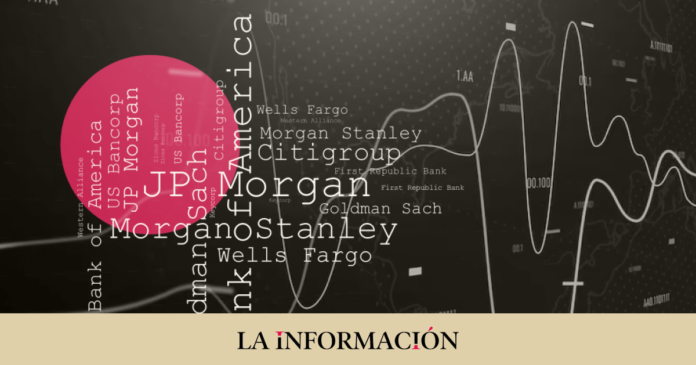The financial markets close a week to forget. The tensions in the stock markets, in which there have been moments of collapse, have affected the optimism that had reigned on the stock markets since the beginning of the year. When the only fear prevailing among investors was that central banks would go too far with interest rate hikes, the fall (or almost) of four retail banks in the United States in less than a week (Silvergate, SVB, Signature and First Republic Bank) has turned the stock market upside down, eroding the stocks of the Wall Street banking giants.
The heavyweights of the American bank have left more than 150,000 million valuation on the stock market between March 9 and 17. The most affected has been Bank of America, which yields more than 35,000 million, which represents more than 15% of its market capitalization. He is on the heels of JP Morgan, whose trail of losses leads him to lose the level of 400,000 million dollars of capitalization. The bleeding is also palpable in Wells Fargo, which is worth some 20 billion less, in line with Morgan Stanley, Goldman Sachs, US Bancorp and Citigroup, with value declines ranging between 10 and 20 billion.
To these stock market losses must be added the oxygen that they have breathed into First Republic Bank -not including US Bancorp- for a value of 30,000 million dollars together with other entities such as BNY Mellon or State Street, among others, in an attempt to because the situation It does not end in a financial crisis like that of 2008. For now, the bankruptcy of SVB Financial, which formally requested it this Friday, represents the largest bankruptcy in more than a decade and widens the rift between the large and regional banks US.
The reaction of investors suggests that they are wary that there are no more victims. First Republic Bank continues to be one of the major sufferers despite the injection received. Its titles are already worth a quarter less than a week ago, when it was valued at over 21 million, while Western Alliance sees its capitalization almost halved. Worse off are Keycorp and Zions Corp, as their share prices fall to a third of what they cost at the beginning of March. In this sense, the KBW Banks index of the United States has experienced a collapse of almost 15% in the last week, mainly reflecting the effects of the First Republic crash, among others. The fall is similar to that experienced in the previous five days, when it was weighed down by SVB before suspending its listing.
To get an idea, the last time KBW Banks had a setback of this type was in March 2020, at the height of the global coronavirus health emergency, and in February 2009, the date after the collapse of Lehman Brothers and the rescue of Merrill Lynch by Bank of America. In a monthly rate, the blow reaches 28%, the third largest in the last fourteen years after Covid and the financial crisis. In this scenario, Sean Shepley, senior economist at Allianz, urges caution when considering the outlook for equities and other risky assets, as the market will be more sensitive to central bank tightening while the threat of recession begins to condition investors’ decisions to a greater extent.
“The bankruptcy of SVB, Signature Bank and Silvergate Bank clearly show the lack of regulatory oversight of the shadow banking sector and the dangers of banks relying on a fragile deposit base,” warns Jérémie Boudinet, Head of Investment Grade Credit in La Francaise AM. The expert specifies that although the banking sector cannot escape the macroeconomic and microeconomic misfortunes of the so-called ‘shadow banking’, he values the “solidity of the balance sheets”, as well as the “high amounts of liquid assets”.
Federal in 300,000 million dollars in the form of liquidity to banks through an emergency window to guarantee “additional funds” so that entities can meet their liquidity needs, since it serves as an umbrella to protect the entire sector. “Some of these smaller banks will reorganize their business models to reduce the risk of a similar situation occurring,” they point out. However, they warn that it is “too early” to know if the crisis is over. The dark clouds are still present in the world stock markets.

